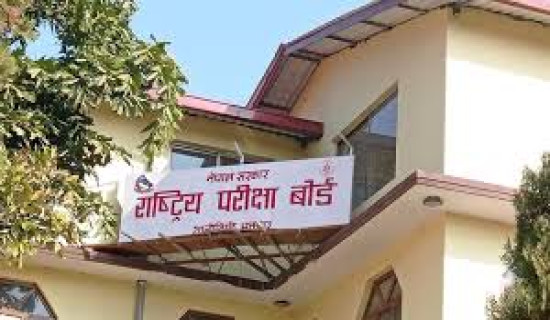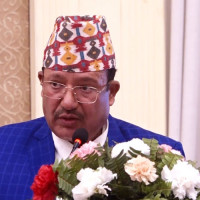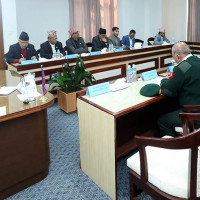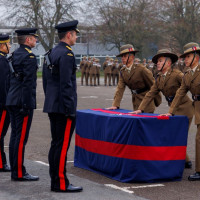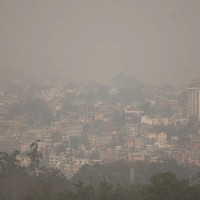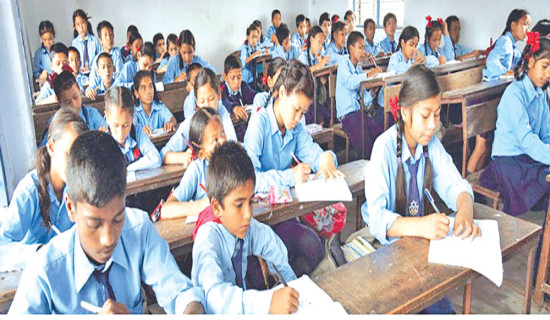- Wednesday, 18 February 2026
Breakthrough in Nepal’s transitional justice process
Kathmandu, Aug. 11: Recently, a significant breakthrough occurred in transitional justice as Nepal's major three parties reached a consensus to resolve the issue as swiftly as possible, advancing the peace process.
For a long time, the parties were standing on two poles over this pressing issue. A Bill to Amend the Disappeared Persons’ Enquiry, Truth and Reconciliation Commission Act, 2071, widely referred to as the transitional justice bill, was presented to parliament on 19 March 2023 but it was not given adequate attention by the parliament for long.
The scenario finally changed from August 1 after a taskforce of Home Minister Ramesh Lekhak from Nepali Congress, Deputy General Secretary Janardan Sharma from CPN-Maoist and Chief Whip Mahesh Kumar Bartaula from CPN-UML reached a consensus to move ahead by resolving disputed issues. After the taskforce reached the consensus, it submitted its report to top leaders of three political parties, UML chair and Prime Minister K.P. Sharma Oli, Nepali Congress president and former Prime Minister Sher Bahadur Deuba, and CPN (Maoist Centre) chairman and former Prime Minister Pushpa Kamal Dahal 'Prachanda' on August 7. Following the agreement between top-level political leaders, the 40th meeting of Law, Justice and Human Rights Committee of the House of Representatives held on Thursday unanimously passed the Bill. Now the Bill will be forwarded to parliament for the approval.
What are the agreements
After a month-long discussion, the taskforce found consensus on all the key issues. There has been an agreement to list intentional and arbitrary killings as serious violations of human rights and to reduce the sentence of the guilty in serious violations of human rights by 75 per cent. A victim who is unwilling to reconcile can move the court against the perpetrators.
All the disqualified Maoist combatants including child soldiers, along with the families of security personnel who lost their lives or were injured during the insurgency, will get reparation and compensation, as per the agreement.
What leaders said
Speaking during the handover ceremony of the report, Prime Minister K.P. Sharma Oli said that the agreement had been reached keeping the Supreme Court’s verdicts, international norms and victim-friendly issues in mind and that it has proved to be a milestone in the peace process.
PM Oli said that the Bill has been brought to ensure such conflicts don’t take place in future. He added that they would immediately start work on forming a commission on mutual consultation and consensus after the Bill is passed.
Maoist Centre chairman Dahal described the task force’s report as a good work after the formation of the new government, while also recalling efforts made in the past for consensus. He urged for conclusion of the report through the Parliament’s legal process so that it would send a message of peace, stability and development to Nepalis.
NC president Deuba said that the taskforce had set an example worth emulating to the world by sending a unique message that Nepalis can solve their disputes on their own. He also expressed his wish for agreement on implementation of the consensus report.
Ramesh Lekhak, Home Minister, said the current TRC bill was victim-friendly. He said that the government was committed to resolve all the problems of the transitional justice by taking all the victims into confidence. This time, the process is not likely to be derailed as the leaders drafted the Bill by seeking consensus from all stakeholders including international community, courts, human rights groups and victims and perpetrators. He urged all to support the government to conclude the process as soon as possible this time.
Victims’ voice
Although the victims are hopeful that progress will be made now, they remain concerned that the mechanisms developed might not be victim-friendly. They fear that the officials appointed to the commission tasked with resolving the problem may not fully understand the feelings of the real victims.
Sushila Chaudhary, a rights activist and also victim leader, said that the focus should now be towards ensuring that the transitional justice commissions get the right leadership as the commissions.
Ram Bhandari, whose father was forcibly disappeared by the state security forces, welcomed the agreement and said, "We now want organisational representation of victims in the reparation mechanism.” He claimed that the transitional justice process had been delayed till now as more focus was given to criminal prosecution while ignoring other pillars of the process.
Devi Khadka, coordinator of National Organisation of Wartime Rape Victims, said conflict victim women would feel relief only if the course of transitional justice would reach a logical conclusion .
How will the process proceed?
Now the chairman of the committee will submit the approved draft of the Bill to the House of Representatives. The tabled Bill will be passed by the House of Representatives after discussions. As the major parties have already agreed, it seems that the Bill will be passed by a two-thirds majority. After it is passed by the House of Representatives, it will be sent to the National Assembly and it will be discussed and passed, and then the President will certify the Bill.
After the completion of this process, the Bill on Disappeared Persons Enquiry, Truth and Reconciliation Commission Act, 2071, will be amended and become a law. According to this Act, the new officials will come to the commissions and the tenure of the commissions will be four years. The commissions will investigate the complaints filed in the commissions.
The commissions will send their recommendations to the Attorney General's Office after the investigation.
The Attorney General's Office can file a case on behalf of the government , but it can also decide not to proceed with the case.
The Attorney General's Office will file a case in a special court, to be established with the same purpose to address transitional justice cases. After the special court judge announces the verdict, victims can appeal to the Supreme Court if not satisfied with the verdict. If there is no appeal, the special verdict will be final. If someone is found guilty and punished in a conflict-time incident by pronouncing a special verdict, the punishment can be reduced by up to 75 per cent except in the rape crime.
Years of delays might end?
The process of transitional justice started after a Comprehensive Peace Accord (CPA) was signed between the then CPN-Maoist and the government on November 21, 2006. After the agreement, the country entered the peace process but it could not resolve because the stakeholders failed to reach a consensus.
The CPA said a commission would be established within one year to investigate the human rights violations that occurred during the conflict and that the situation of the enforced disappeared persons would be made public within six months. In the Interim Constitution, it was mentioned that the commission would be formed within six months.
After 8 years, two commissions were formed on the political divide, but after four years they left without achieving anything. The government again appointed office bearers with new political divisions. The second commission could not work either. The past commissions could not do anything other than collecting complaints. The future commissions are challenged to study and recommend those complaints. Because of true willingness of authorities, transitional justice has been pushed beyond the solution.
Records show that as many as 3,223 complaints of enforced disappearances implicating either security forces or the Maoists have been lodged at the Disappearances Commission. It has picked for investigation 2,494 cases falling under its jurisdiction. Similarly, 63,718 complaints have been registered with the Truth Commission.
Past activities have raised doubts about the process again, but this time there is more hope. Many stakeholders, including major political parties, have reached a consensus to move forward with the process. It is essential for all sides to support and advance the process in order to complete it for the benefit of the nation and the victims.



